

SUBSCRIBE TO OUR FREE NEWSLETTER
Daily news & progressive opinion—funded by the people, not the corporations—delivered straight to your inbox.
5
#000000
#FFFFFF
To donate by check, phone, or other method, see our More Ways to Give page.


Daily news & progressive opinion—funded by the people, not the corporations—delivered straight to your inbox.

Laurel Sutherlin, RAN, (415) 246-0161, laurel@ran.org
The quickly growing international campaign pressuring JPMorgan Chase to end its massive funding of extreme fossil fuels continued to escalate today as a delegation representing Indigenous and nonindigenous communities from Canada to Ecuador and across the U.S. gathered at Chase's annual shareholder meeting in Plano, Texas. The delegation represents the broad range of people suffering harm from the environmental, Indigenous rights and climate impacts connected to the bank's financing of the most dangerous and polluting forms of fossil fuels.
Among major U.S. banks, JPMorgan Chase is the biggest funder of extreme fossil fuels: tar sands, Arctic oil; ultra-deepwater oil; liquefied natural gas export; and coal mining and power. It is also a major funder of oil drilling in the Amazon rainforest.
An open letter penned by the delegation to shareholders, spotlights JPMorgan Chase in particular because of the unique scale and seriousness of the consequences stemming from its funding choices. "Jamie Dimon opens his most recent shareholder letter by boasting that JPMorgan Chase has 'helped communities large and small.' He omits mention of the other side of the balance sheet - the harm that his bank has done to communities like ours through its fossil fuel financing," reads the delegation in the open letter.
Today's protest comes just one week after a nationwide day of action saw hundreds of people engage in demonstrations at Chase branches in cities across the country, including New York, Los Angeles, San Francisco, Portland and Minneapolis. In downtown Seattle, 14 arrests were made after demonstrators staged a dramatic action that shut down the streets outside while others occupied Chase's regional headquarters.
A briefing paper released recently by Rainforest Action Network (RAN) reveals that in spite of the urgent climate crisis and a public commitment to the Paris Agreement, JPMorgan Chase is doubling down on some of the most carbon-intensive, financially risky, and environmentally destructive fossil fuel sectors. According to the paper, which highlights data from Banking on Climate Change 2018, Chase is the biggest U.S. backslider, with extreme fossil fuel financing more than $4 billion higher in 2017 than 2016. For coal mining, the bank's financing in 2017 was a startling 21 times higher than the previous year -- this despite the bank's policy to reduce its credit exposure to coal mining companies. And in the Amazon, a report from Amazon Watch shows that the bank invests heavily in companies with licenses to explore and/or drill in the Amazon rainforest on or near the territories of Indigenous nations that oppose oil extraction on their lands.
Delegates attending the AGM include Joye Braun of Indigenous Environmental Network, Tara Houska of Honor the Earth, Cherri Foytlin of Louisiana Rise, Cedar George-Parker of the Indigenous Youth Council, Bryan Parras of Sierra Club and Deyadira Arellano of the Texas Environmental Justice Advocacy Services (TEJAS), Jessica Lorena Rangel of Eyes of a Dreamer, Paul Corbit Brown of the Keeper of the Mountains Foundation, Yolonda Bluehorse and Frankie Orona of the Society of Native Nations, Manari Ushigua of the Sapara Nation in the Ecuadorian Amazon, Juan Mancias of the Carrizo/Comecrudo Tribe of Texas and Patrick McCully of Rainforest Action Network (RAN), Diana Best of Greenpeace USA and others.
Bios and Statements from delegation members:
Joye Braun (Cheyenne River Sioux), of Indigenous Environmental Network says:
"I'm fighting Chase bank because they fund Keystone XL pipeline and they're the biggest US bank that funds tar sands. And should the Keystone XL pipeline break along the Cheyenne River, it will reach the water intake of my people on my reservation within 33 minutes. We can't afford this. The time is now to stand up against climate change. The time is now to stand up against JPMorgan Chase."
Joye Braun (Cheyenne River Sioux Tribe) with Indigenous Environmental Network (IEN). Joye lives in South Dakota and will be attending & organizing to speak on behalf of communities in the route of the KXL pipeline. Joye was an early representative at Standing Rock and part of the many prayers, actions and meetings that took place.
Tara Houska (Couchiching First Nation), of Honor the Earth says:
"JPMorgan Chase has dramatically increased its backing of tar sands, the dirtiest, most carbon-intensive fuel on the planet. The heart of my people's culture would be obliterated if and when Enbridge's Line 3 tar sands pipeline breaks in Minnesota's vast watersheds and rich wild rice beds -- Chase can play a major role in preventing this from happening by ending its credit relationships with Enbridge and all destructive fossil fuel actors."
Tara Houska (Couchiching First Nation) is an attorney and National Campaigns Director with Honor the Earth, and will be representing the Anishinaabe people and the Great Lakes region from the impending threat of Enbridge's Line 3 tar sands pipeline. Tara was Senator Bernie Sanders Native American Adviser during his Presidential Campaign. Tara was also a strong voice and presence at Standing Rock & has carried on divestment work internationally over the past two years.
Cherri Foytlin of Louisiana Rise says:
"These Big Banks just can't seem to get it right - they say one thing but do another. When they keep pumping money into dirty fossil fuel companies and projects, it makes us all sick. Sick from the pollution, sick from the injustice, sick from an addiction that is killing us and our planet. We are done being a sacrifice zone, and we are done with your corporate lies. The people of Louisiana are gathering now to right your wrong. We will stop Energy Transfer Partners, and end your bad investments, such as the Bayou Bridge Pipeline. We are rising above your lies, your pollution, and your greed."
Cherri Foytlin (Latinx, Black, Indigenous heritage) from Southern Louisiana. Cherri walked over 1,200 miles from Louisiana to Washington DC after the BP oil spill. Cherri has been a national movement leader to end offshore drilling and to stop the Bayou Bridge Pipeline.
Cedar George-Parker (T'sleil Waututh) says:
"The Trans Mountain Kinder Morgan pipeline will kill my land, salmon, and way of life. We will do whatever it takes to stop the pipeline-educationally, politically, and culturally."
Cedar George-Parker is a member of T'sleil Waututh Youth and has followed a family tradition of leadership in his community. He has been active in the Vancouver area and with the Coastal Salish Indigenous First Nations to stop Kinder Morgan's Trans Mountain tar sands pipeline expansion.
Deyadira Arellano of the Texas Environmental Justice Advocacy Services says:
"JPMorgan Chase prides itself on being a great community partner, but we know that our neighborhoods are affected by their investments in unregulated industries that either pollute or lock-up our families, and sometimes do both!"
Deyadira is a Texas Community Health Worker/Promotora for Texas Environmental Justice Advocacy Services. Her work as a community organizer includes the intersection of issues such as immigration, public education, environmental justice, healthcare, and workers' rights. Her Mexico/Tejas connection, grounded in family heritage and respect for nature, has given her the understanding to preserve and restore our land, resources, species, and humanity through collective decision-making, public pressure, and civic engagement. Following the effects of Hurricane Harvey in Houston and surrounding areas, Deyadira continues to support mutual-aid efforts and advocates for recovery justice.
Bryan Parras of the Sierra Club says:
"As a top funder of extreme fossil fuel development, JPMorgan Chase is directly contributing to the pollution of our air and water and climate disasters like Hurricane Harvey. It's time for Chase to stop funding fossil fuels, pipelines, and other destructive industries, like private prisons and gun manufacturers, that threaten the health and safety of our communities. It's time to start investing in a future that promotes prosperity for all our relations."
Bryan Parras is a Gulf Coast Organizer with the Sierra Club's Beyond Dirty Fuels campaign. He is also a co-founder of the Texas Environmental Justice Advocacy Services (t.e.j.a.s.) and has been organizing in the Houston area around environmental justice and public health issues for almost 20 years.
Jessica Lorena Rangel is the founder of Eyes of a Dreamer, an organization devoted to uprooting xenophobic stereotypes by telling the stories of immigrants through powerful images and words. She is also one of the five global moderators for the Immigration Subreddit. In her hometown of Pasadena, TX, she played a leading role in local organizing against SB4, a punitive law targeting sanctuary cities. In the wake of the devastating Hurricane Harvey, Jessica has been tirelessly working to get aid to undocumented families. Dismantling discrimination against all immigrants and empowering women of color, she is an emerging voice and leader for immigrant communities in Texas and beyond.
SPANISH: "Comunidades afectadas por las malas decisiones departe de el banco "JPMorgan Chase" son las mismas comunidades que son dejadas atras cuando estos proyectos quedan mal. La comunidad Latina, se solidariza con las demas comunidades afectadas. Nuestra gente, incluyendo las personas indocumentadas, merecen un futuro con cero fosiles en el que seamos tratados bien y podamos vivir sin miedo."
"Communities affected by bad decisions by the bank "JPMorgan Chase" are the same communities that are left behind when these projects go wrong. The Latino community, stands in solidarity with the other affected communities. Our people, including undocumented people, deserve a future with zero fossils in which we are treated well and we can live without fear."
Manari Ushigua of the Sapara Nation in the Ecuadorian Amazon, says:
"Our prophecies foretold that the day would come when foreigners would try to invade our territory and we would have to resist or be wiped out. If Andes Petroleum, whose parent companies are financed by JP Morgan Chase, begins to drill for oil in our territory, it would lead to the destruction of our homes and our ancestral knowledge. We must keep the oil in the ground, and help people learn how to heal Mother Earth. Our fight is not to slow the advancement of the rest of the world. Our fight is to defend life."
Manari Ushigua Santi is a traditional healer and leader-- an akameno (authority) -- of the Sapara Nation in the Ecuadorian Amazon. He is from the community of Llanchamacocha, along the Conambo River in the region's remote roadless rainforest. He was instrumental in achieving recognition for the Sapara as a distinct ethnicity from the Ecuadorian government, and winning recognition from UNESCO for the Sapara as an "Intangible Cultural Heritage of Humanity". Manari has helped defend his territory from resource extraction for decades. Manari also serves as an Environmental Ambassador for Ecuador's Education Ministry.
Juan Mancias (Carrizo/Comecrudo Tribe of Texas) says:
"When the Carrizo/Comecrudo ancestral lands continue to be desecrated by fossil fuel corporations without due diligence, historical research, and Texas tribal consultation by either recognize or unrecognized Tribal Nations. The lack of respect to these descendants who speak and live their ancestral lifeways is an evil crime toward human beings and adds to the ongoing genocide of the Native Original People of Texas."
Juan Mancias is tribal chair of the Carrizo/Comecrudo Nation of Texas, also known as the Esto'k Gna. Juan works to promote, maintain and preserve the Carrizo/Comecrudo culture, including by defending his people's sacred lands against fossil fuels and other threats.
Paul Corbit Brown of the Keeper of the Mountains Foundation says:
"Any investment is a gamble, and every company or individual has the right to gamble their own resources in the hopes of making a profit. However, no company, no individual has the right to gamble that which does not belong to them. Your money is far from the only asset that is at risk due to your investments in fossil fuels. Also on the table are the health of those living in the communities affected by the industries you support and profit from; the damage and devastation to the resources that WE ALL rely on such as clean water and clean air; and lastly, climate change. We are long past the time for taking climate change seriously. There is no debate among those who are thinking clearly and honestly."
Paul Corbit Brown (European American) is a long time resident of Fayette County, West Virginia. Paul is an avid photographer & educator using his skills to challenge mountaintop removal and coal mining. Paul is active with the Keeper of the Mountains Foundation, an organization dedicated to protecting the Mountains, water and People of West Virginia.
Frankie Orona (Tongva & Chumash) of the Society of Native Nations says:" Enough is "Enough, we must hold JPMorgan Chase accountable for being the largest funder of the destruction, contamination, and genocide of our Mother Earth and to our future generations. We must stand together now and demand change away from fossil fuels. By the time our children stand up for themselves, it might be too late, we need to stand together to wake up the world."
Co-Founder & Executive Director of Society of Native Nations (SNN)
Husband, Father, Entrepreneur and Activist, Co-Founder and Executive Director of Society of Native Nations (SNN). Frankie is Tongva and Chumash from California and Borrado from Texas. He is CEO of his IT company which delivers programming in the IT hardware and software sectors. He is a graduate of the University of La Verne and ITSP. He turned his lifelong passion of serving indigenous communities into the Society of Native Nations. A 501c3 that focuses on Native American rights, social justice, environmental justice and youth education. SNN works to help protect Native American spirituality, culture and traditional values. Frankie continues to work as an entrepreneur, allowing him the time needed to continue helping his community and people to preserve the spirituality and way of life of the indigenous communities of North and South America. His goal is to help create a better future for his children and all future generations. Frankie lives in San Antonio with his wife and children.
Yolonda Bluehorse (Lakota) of the Society of Native Nations says:
"Financial institutions like JPMorgan Chase, do not realize that by supporting big oil corporations, they are also supporting the poisoning of Mother Earth and her most precious resources we human beings need to survive."
Yolonda Bluehorse (Lakota) with Society of Native Nations have both been active in fighting Energy Transfer Partners (ETP) through opposition to the Trans Pecos Pipeline, divestment and at ETP Headquarters in Dallas.
David Hill (Choctaw Nation of Oklahoma)
"Let me tell you, our dignity is not for sale.... If someone doesn't speak up, no one will."
David worked as a union electrician; Director / Coordinator of Indian Center in Salt Lake City, Utah; Youth Alcohol and Drug Counselor at the Oklahoma City Indian Center and in Rapid City, South Dakota. He has been an advocate against alcohol and drug use as an activist his whole life and with the American Indian Movement since 1972. He has served with the Leonard Peltier Defense Committee as Director three times and National Advisor to the present time. He has organized national horse rides and demonstrations to bring awareness to the issue of unjust incarceration through violations of the U.S. Constitution against native people. David Hill continues to support events and demonstrations for indigenous rights, treaty rights, and human rights.
Patrick McCully of Rainforest Action Network says:
"It is sadly not surprising that JPMorgan Chase is the biggest Wall Street founder of extreme fossil fuels given that its CEO, Jamie Dimon, shows zero understanding of the climate crisis, and that its longest serving board member, Lee Raymond, is the former CEO of ExxonMobil. Under Raymond, ExxonMobil spread disinformation about climate change, and poured millions of dollars into the worst climate denying organizations. Mr Dimon needs to get an education on climate change, and JPMorgan Chase's shareholders need to replace Mr Raymond with someone from a clean energy background."
Patrick McCully is Climate and Energy Program Director for Rainforest Action Network.
Diana Best of Greenpeace USA says:
"Chase has a pipeline problem. While other banks around the world have recognized that funding extreme fossil fuel projects and the related companies is incompatible with any credible policy on human rights and climate change, Chase has doubled down. Chase continues to fund Energy Transfer Partners, the company behind the highly controversial Dakota Access oil pipeline, as well as other companies attempting to build devastating new tar sands pipelines. Chase is dragging its feet as the world is rapidly moving away from fossil fuels, threatening not only Indigenous rights, water, and the climate, but also its own reputation in the process."
Diana Best is a Senior Energy Campaigner for Greenpeace USA and Global Pipeline Finance Lead.
Established in 1990 within the United States, IEN was formed by grassroots Indigenous peoples and individuals to address environmental and economic justice issues (EJ). IEN's activities include building the capacity of Indigenous communities and tribal governments to develop mechanisms to protect our sacred sites, land, water, air, natural resources, health of both our people and all living things, and to build economically sustainable communities.
"Thank you to the hundreds of thousands of Americans across the country who are standing up and speaking out for our voting rights, fundamental freedoms, and essential services like Social Security and Medicare."
In communities large and small across the United States on Saturday, hundreds of thousands of people collectively took to the streets to make their opposition to President Donald Trump heard.
The people who took part in the organized protests ranged from very young children to the elderly and their message was scrawled on signs of all sizes and colors—many of them angry, some of them funny, but all in line with the "Hands Off" message that brought them together.
"Thank you to the hundreds of thousands of Americans across the country who are standing up and speaking out for our voting rights, fundamental freedoms, and essential services like Social Security and Medicare," said the group Stand Up America as word of the turnout poured in from across the country.
A relatively small, but representative sample of photographs from various demonstrations that took place follows.
Demonstrators gather on Boston Common, cheering and chanting slogans, during the nationwide "Hands Off!" protest against US President Donald Trump and his advisor, Tesla CEO Elon Musk, in Boston, Massachusetts on April 5, 2025. (Photo by Joseph Prezioso / AFP)
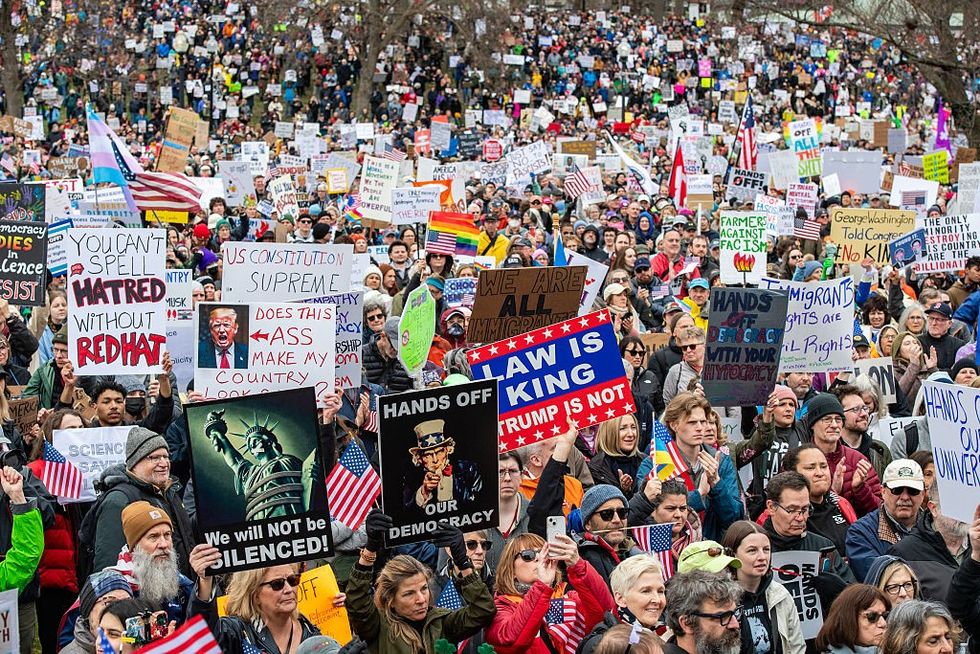
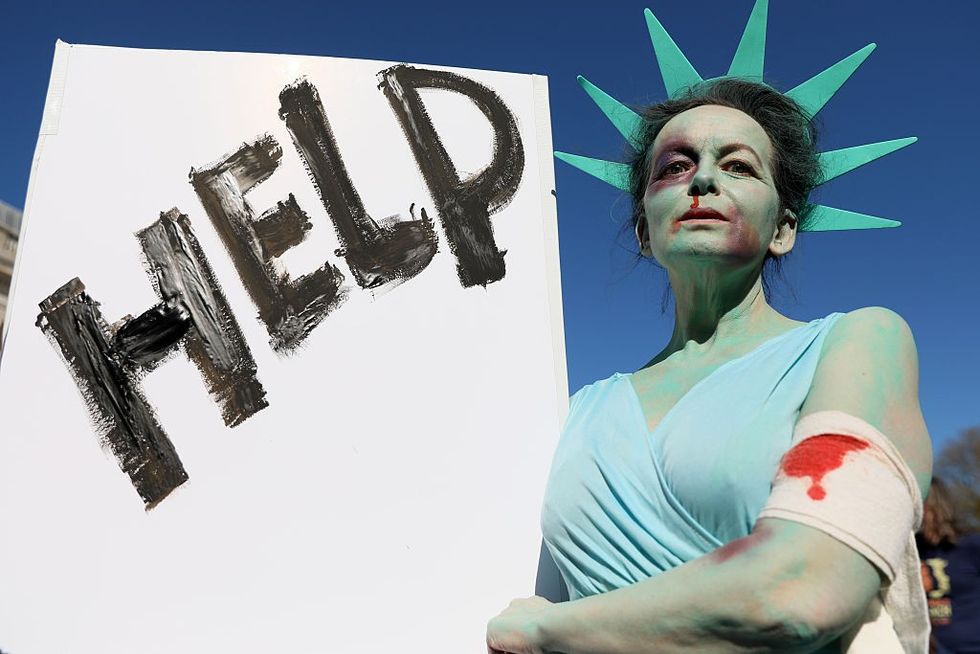
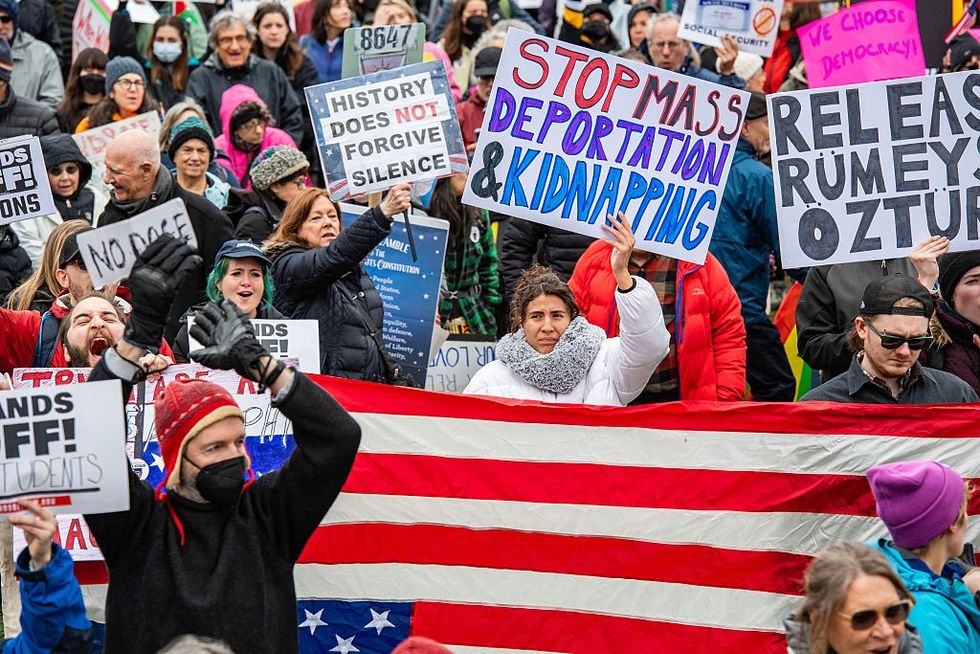
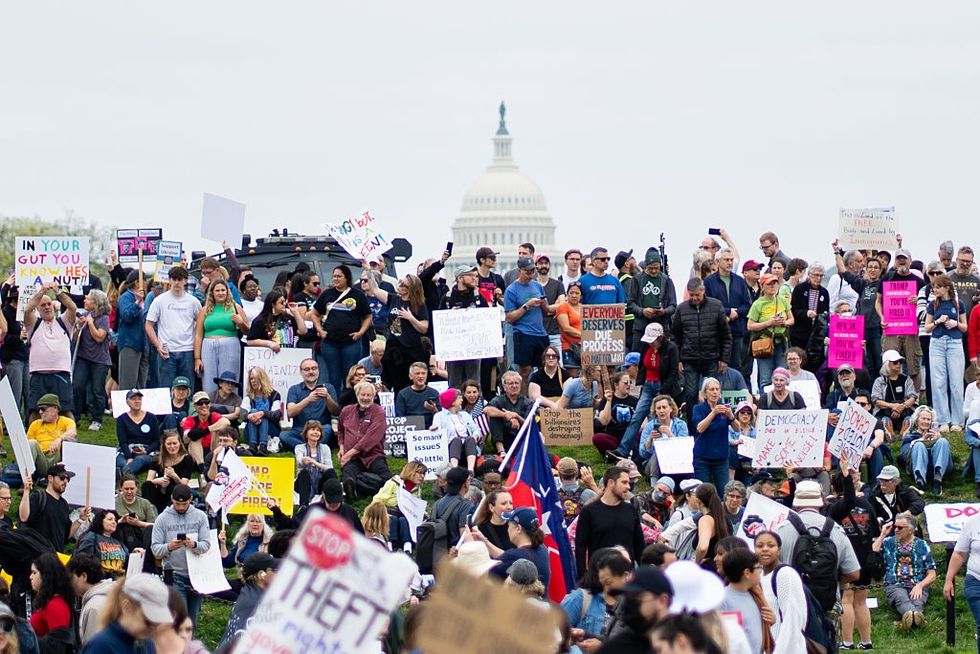
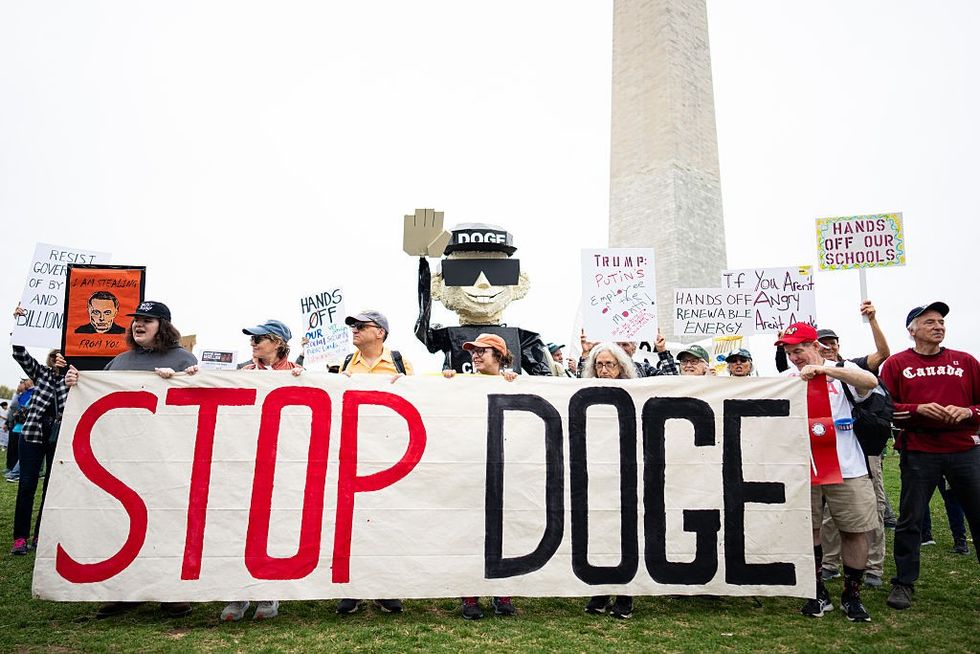
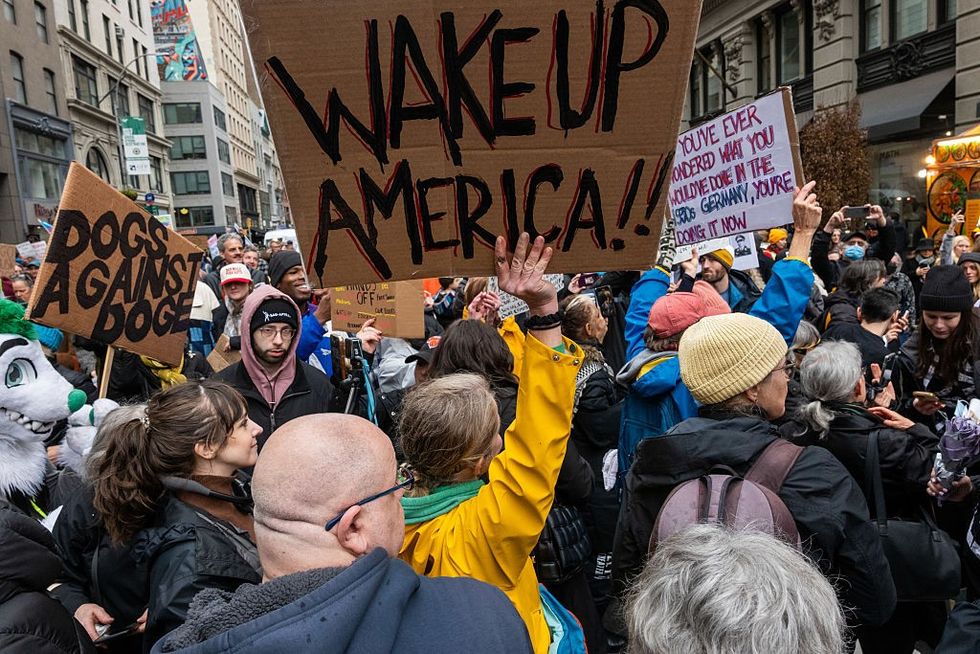
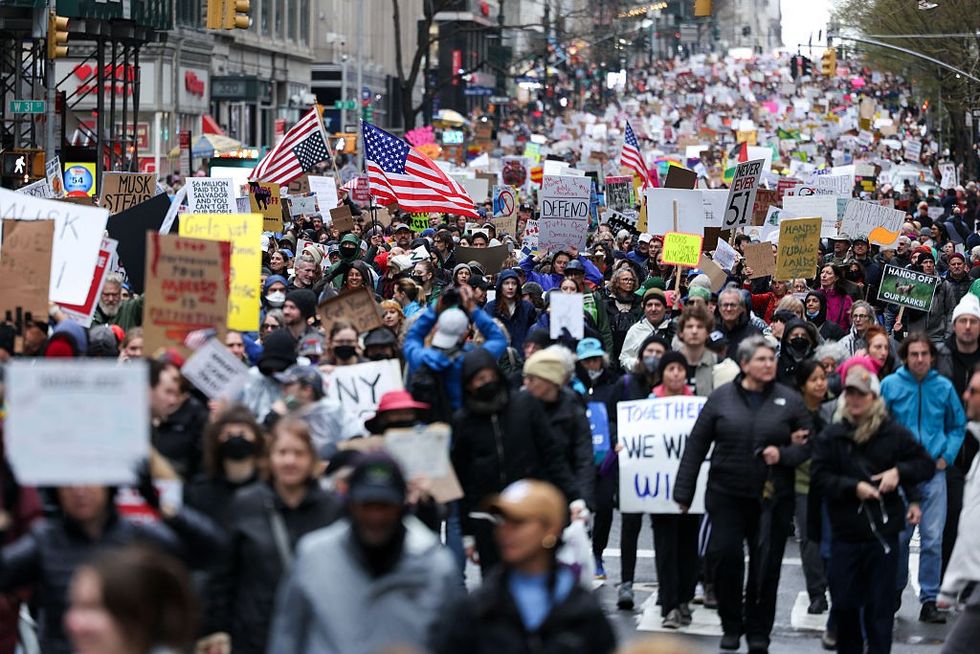
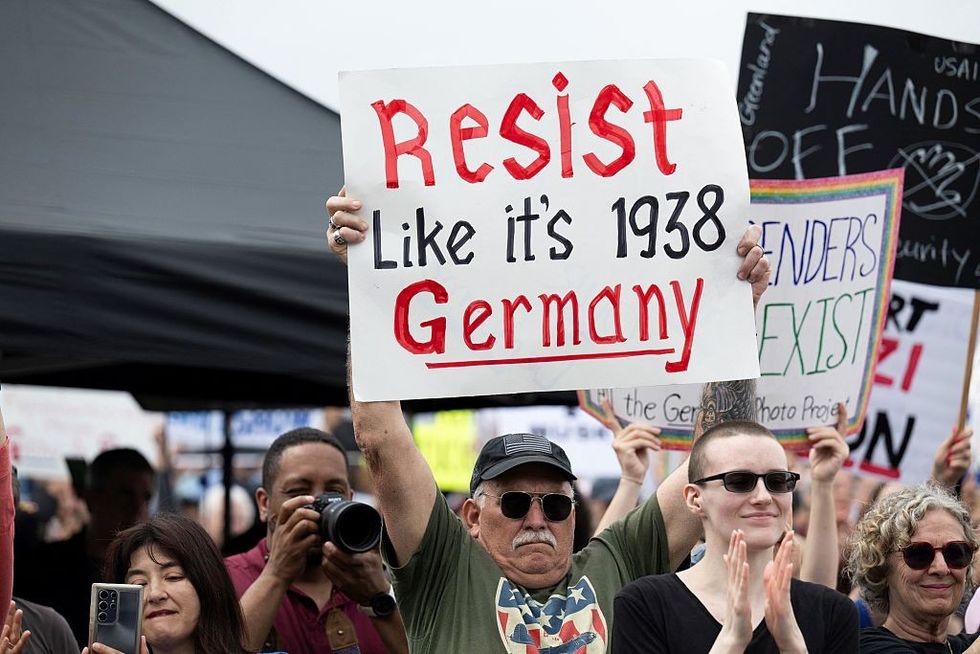
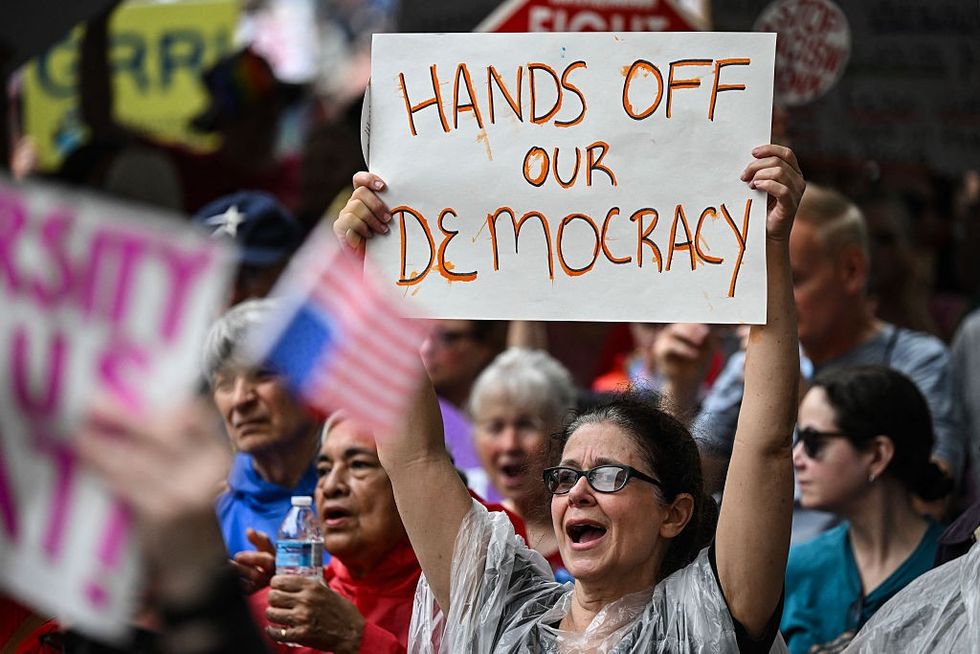
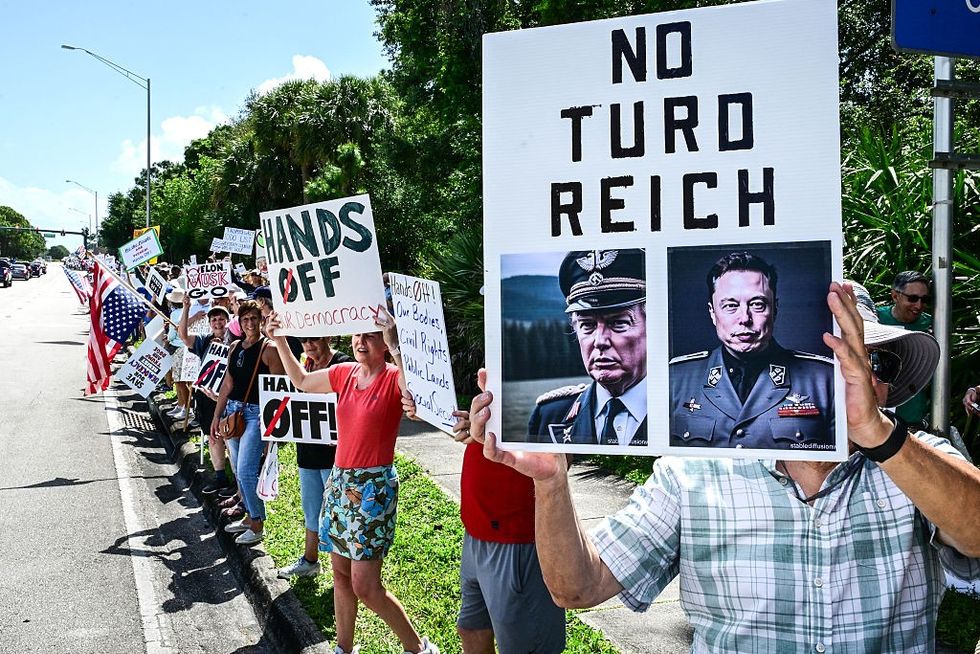
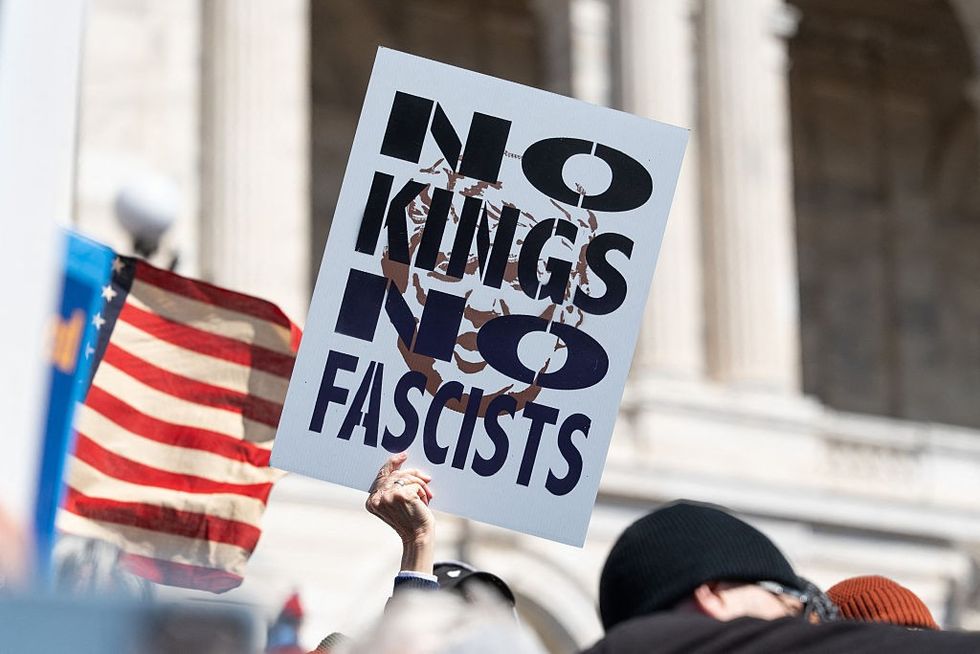
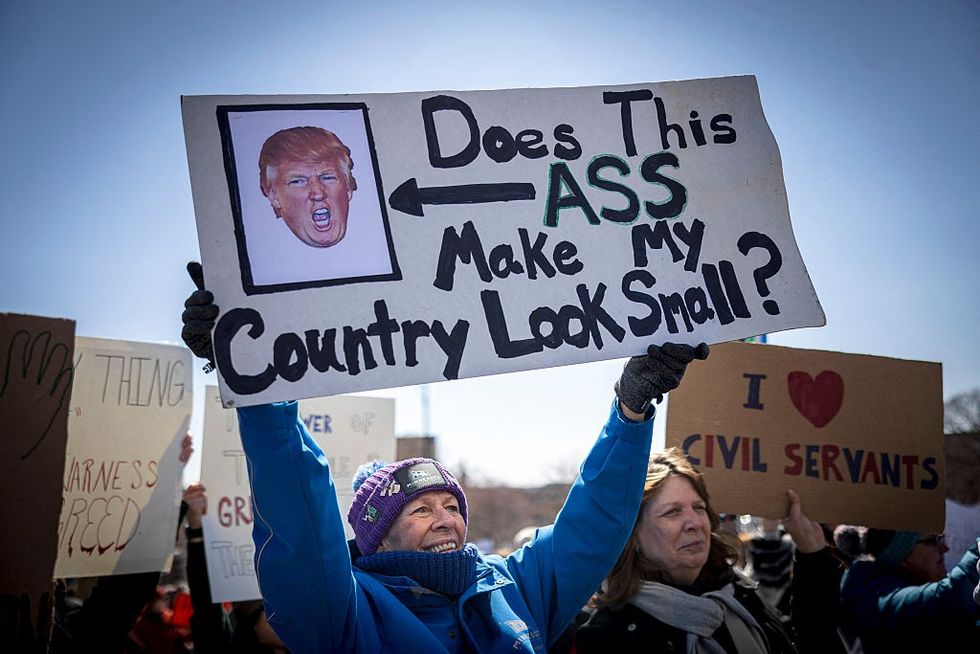
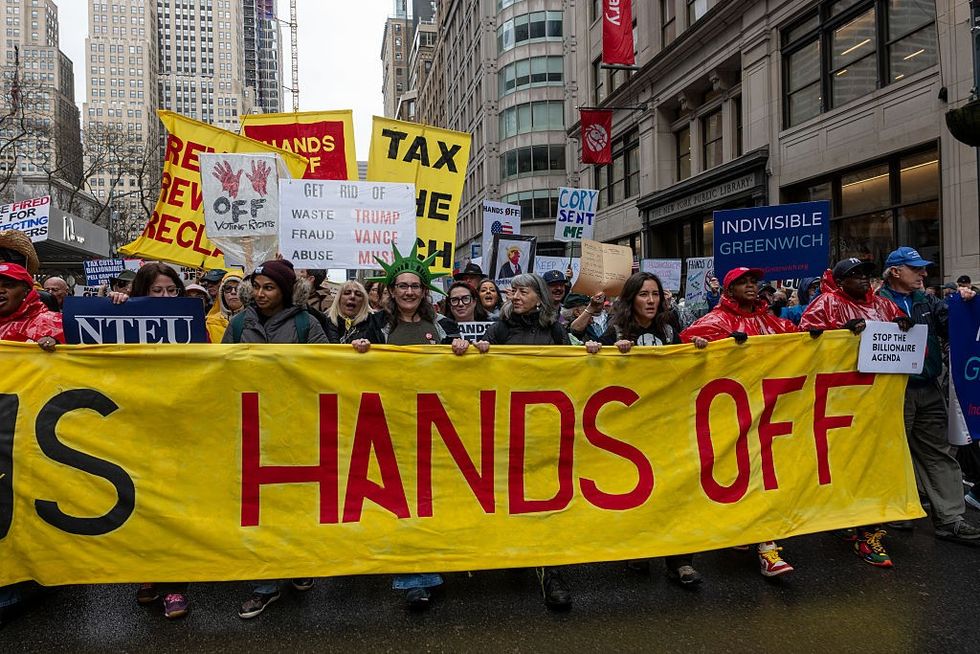
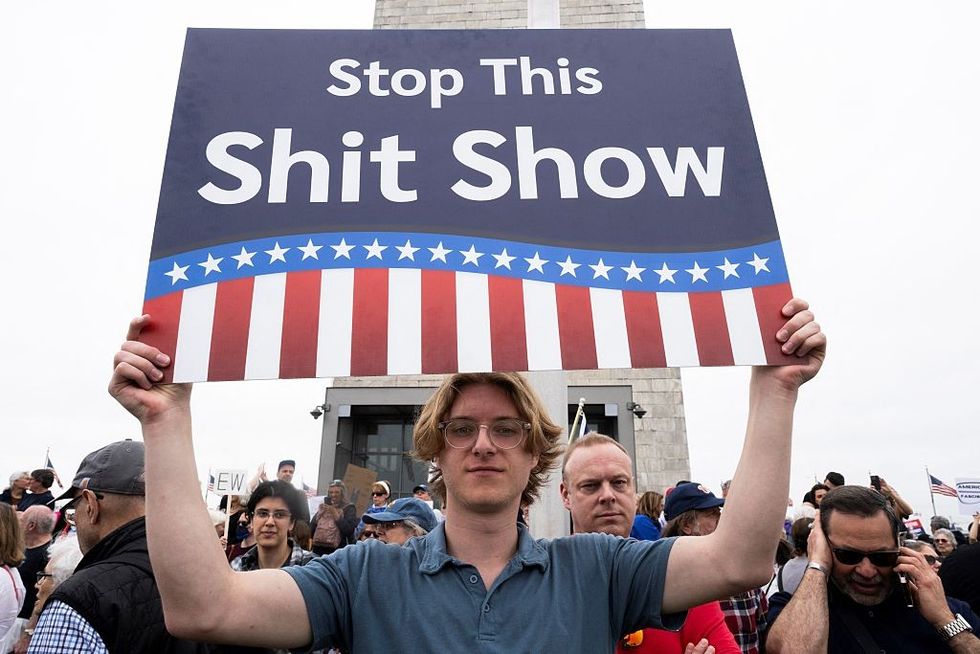
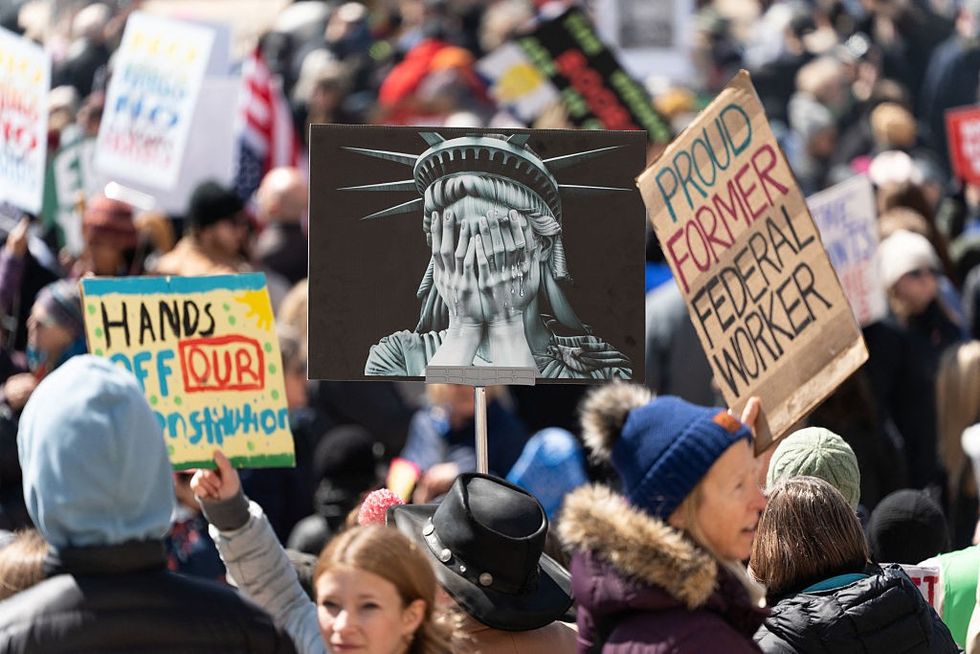
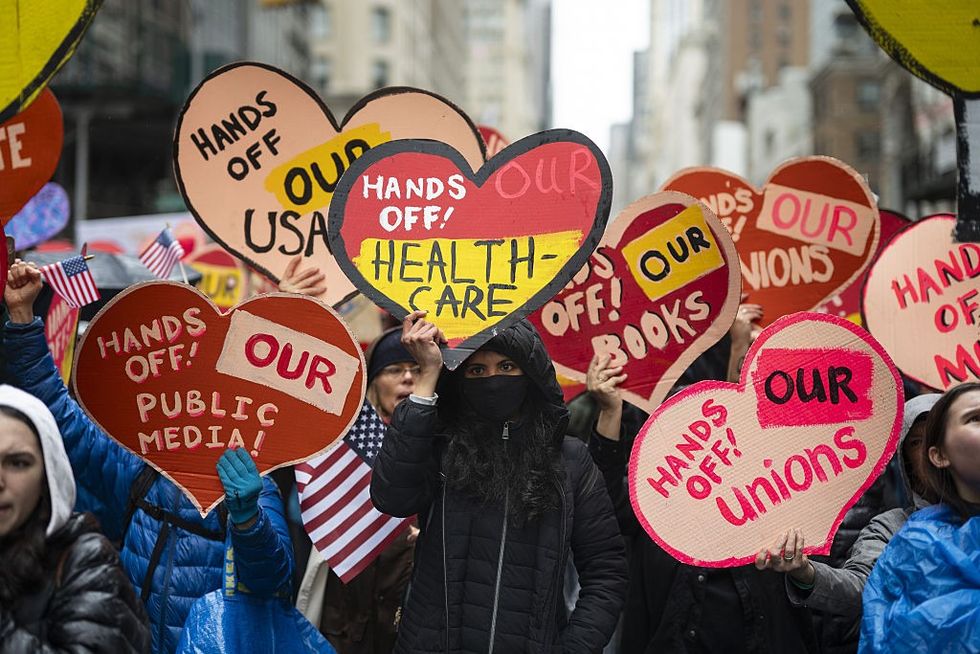
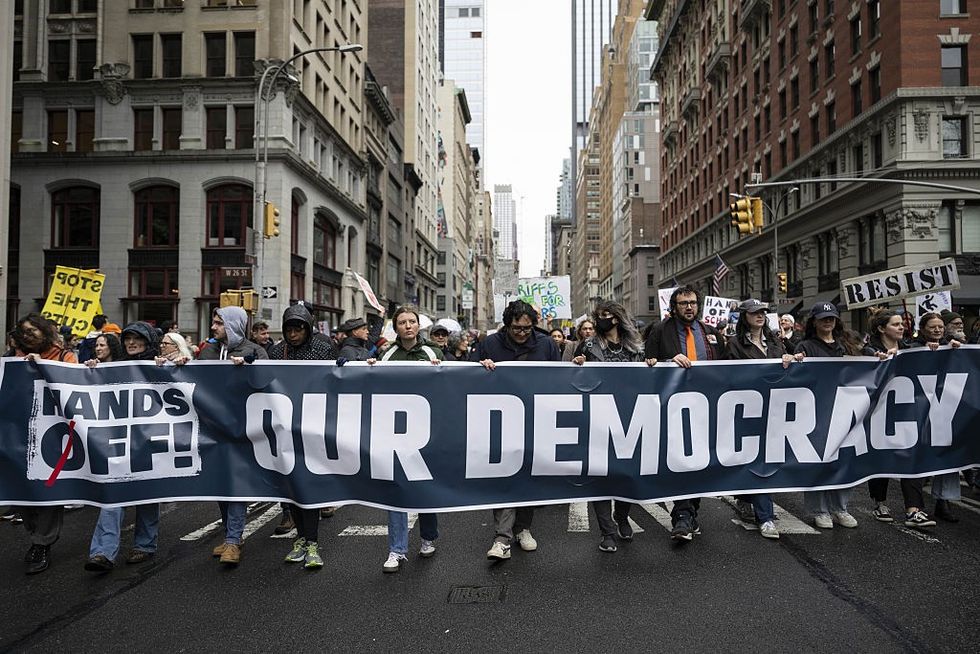
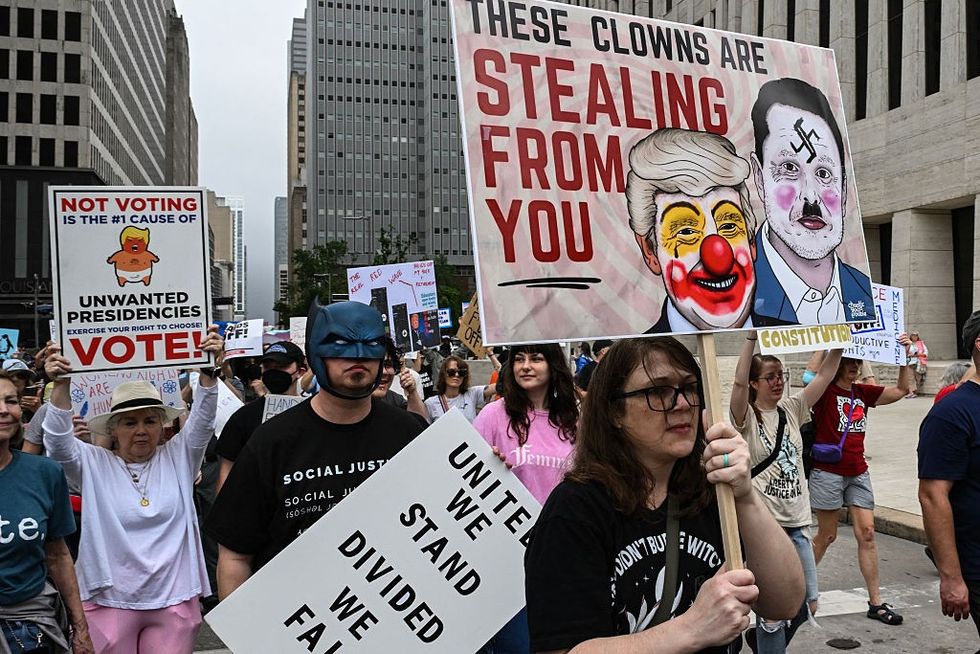
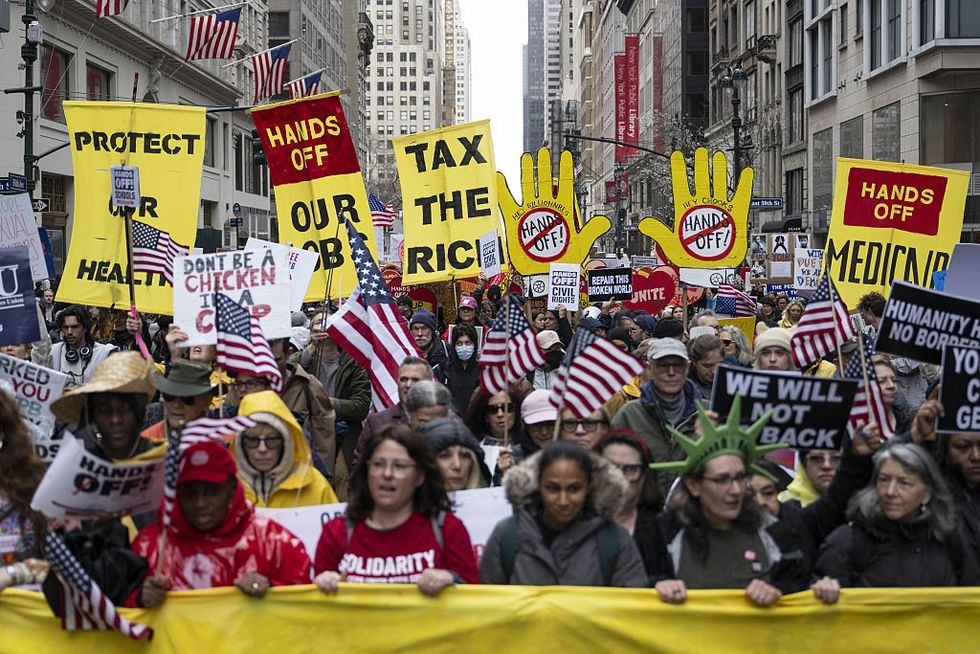
"Everyone involved in this crime against humanity, and everyone who covered it up, would face prosecution in a world that had any shred of dignity left."
A video presented to officials at the United Nations on Friday and first made public Saturday by the New York Times provides more evidence that the recent massacre of Palestinian medics in Gaza did not happen the way Israeli government claimed—the latest in a long line of deception when it comes to violence against civilians that have led to repeated accusations of war crimes.
The video, according to the Palestine Red Crescent Society (PRCS), was found on the phone of a paramedic found in a mass grave with a bullet in his head after being killed, along with seven other medics, by Israeli forces on March 23. The eight medics, buried in the shallow grave with the bodies riddled with bullets, were: Mustafa Khafaja, Ezz El-Din Shaat, Saleh Muammar, Refaat Radwan, Muhammad Bahloul, Ashraf Abu Libda, Muhammad Al-Hila, and Raed Al-Sharif. The video reportedly belonged to Radwan. A ninth medic, identified as Asaad Al-Nasasra, who was at the scene of the massacre, which took place near the southern city of Rafah, is still missing.
The PRCS said it presented the video—which refutes the explanation of the killings offered by Israeli officials—to members of the UN Security Council on Friday.
"They were killed in their uniforms. Driving their clearly marked vehicles. Wearing their gloves. On their way to save lives," Jonathan Whittall, head of the UN's humanitarian affairs office in Palestine, said last week after the bodies were discovered. Some of the victims, according to Gaza officials, were found with handcuffs still on them and appeared to have been shot in the head, execution-style.
The Israeli military initially said its soldiers "did not randomly attack" any ambulances, but rather claimed they fired on "terrorists" who approached them in "suspicious vehicles." Lt. Col. Nadav Shoshani, an IDF spokesperson, said the vehicles that the soldiers opened fire on were driving with their lights off and did not have clearance to be in the area. The video evidence directly contradicts the IDF's version of events.
As the Timesreports:
The Times obtained the video from a senior diplomat at the United Nations who asked not to be identified to be able to share sensitive information.
The Times verified the location and timing of the video, which was taken in the southern city of Rafah early on March 23. Filmed from what appears to be the front interior of a moving vehicle, it shows a convoy of ambulances and a fire truck, clearly marked, with headlights and flashing lights turned on, driving south on a road to the north of Rafah in the early morning. The first rays of sun can be seen, and birds are chirping.
In an interview with Drop Site News published Friday, the only known paramedic to survive the attack, Munther Abed, explained that he and his colleagues "were directly and deliberately shot at" by the IDF. "The car is clearly marked with 'Palestinian Red Crescent Society 101.' The car's number was clear and the crews' uniform was clear, so why were we directly shot at? That is the question."
The video's release sparked fresh outrage and demands for accountability on Saturday.
"The IDF denied access to the site for days; they sent in diggers to cover up the massacre and intentionally lied about it," said podcast producer Hamza M. Syed in reaction to the new revelations. "The entire leadership of the Israeli army is implicated in this unconscionable war crime. And they must be prosecuted."
"Everyone involved in this crime against humanity, and everyone who covered it up, would face prosecution in a world that had any shred of dignity left," said journalist Ryan Grim of DropSite News.
"They're dismantling our country. They're looting our government. And they think we'll just watch."
In communities across the United States and also overseas, coordinated "Hands Off" protests are taking place far and wide Saturday in the largest public rebuke yet to President Donald Trump and top henchman Elon Musk's assault on the workings of the federal government and their program of economic sabotage that is sacrificing the needs of working families to authoritarianism and the greed of right-wing oligarchs.
Indivisible, one of the key organizing groups behind the day's protests, said millions participated in more than 1,300 individual rallies as they demanded "an end to Trump's authoritarian power grab" and condemning all those aiding and abetting it.
"We expected hundreds of thousands," the groups said in a statement Saturday evening. "But at virtually every single event, the crowds eclipsed our estimates."
"Hands off our healthcare, hands off our civil rights, hands off our schools, our freedoms, and our democracy."
"This is the largest day of protest since Trump retook office," the group added. "And in many small towns and cities, activists are reporting the biggest protests their communities have ever seen as everyday people send a clear, unmistakable message to Trump and Musk: Hands off our healthcare, hands off our civil rights, hands off our schools, our freedoms, and our democracy."
According to the organizers' call to action:
They're dismantling our country. They’re looting our government. And they think we'll just watch.
On Saturday, April 5th, we rise up with one demand: Hands Off!
This is a nationwide mobilization to stop the most brazen power grab in modern history. Trump, Musk, and their billionaire cronies are orchestrating an all-out assault on our government, our economy, and our basic rights—enabled by Congress every step of the way. They want to strip America for parts—shuttering Social Security offices, firing essential workers, eliminating consumer protections, and gutting Medicaid—all to bankroll their billionaire tax scam.
They're handing over our tax dollars, our public services, and our democracy to the ultra-rich. If we don't fight now, there won’t be anything left to save.
The more than 1,300 "Hands Off!" demonstrations—organized by a large coalition of unions, progressive advocacy groups, and pro-democracy watchdogs—first kicked off Saturday in Europe, followed by East Coast communities in the U.S., and continued throughout the day at various times, depending on location. See here for a list of scheduled "Hands Off" events.
"The United States has a president, not a king," said the progressive advocacy group People's Action, one of the group's involved in the actions, in an email to supporters Saturday morning just as protest events kicked off in hundreds of cities and communities. "Donald Trump has, by every measure, been working to make himself a king. He has become unanswerable to the courts, Congress, and the American people."
In its Saturday evening statement, Indivisible said the actions far exceeded their expectations and should be seen as a turning point in the battle to stop Trump and his minions:
The Trump administration has spent its first 75 days in office trying to overwhelm us, to make us feel powerless, so that we will fall in line, accept the ransacking of our government, the raiding of our social safety net, and the dismantling of our democracy.
And too often, the response from our leaders and those in positions to resist has been abject cowardice. Compliance. Obeying in advance.
But not today. Today we've demonstrated a different path forward. We've modeled the courage and action that we want to see from our leaders, and showed all those who've been standing on the sidelines who share our values that they are not alone.
Citing the Republican president's thirst for "power and greed," People's Action earlier explained why organized pressure must be built and sustained against the administration, especially at the conclusion of a week in which the global economy was spun into disarray by Trump's tariff announcement, his attack on the rule of law continued, and the twice-elected president admitted he was "not joking" about the possibility of seeking a third term, which is barred by the constitution.
"He is destroying the economy with tariffs in order to pay for the tax cuts he wants to push through to enrich himself and his billionaire buddies," warned People's Action. "He has ordered the government to round up innocent people off of the streets and put them in detention centers without due process because they dared to speak out using their First Amendment rights. And he is not close to being done—by his own admission, he is planning to run for a third term, which the Constitution does not allow."
Live stream of Hands Off rally in Washington, D.C.:
Below are photo or video dispatches from demonstrations around the world on Saturday. Check back for updates...
United Kingdom
France
Germany
Belgium:
Massachusetts:
Maine:
Washington, D.C.:
New York:
Minnesota:
Michigan:
Ohio:
Colorado:
Pennsylvania:
North Carolina:
The protest organizers warn that what Trump and Musk are up to "is not just corruption" and "not just mismanagement," but something far more sinister.
"This is a hostile takeover," they said, but vowed to fight back. "This is the moment where we say NO. No more looting, no more stealing, no more billionaires raiding our government while working people struggle to survive."